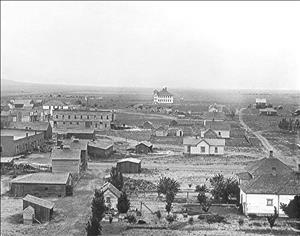On March 27, 1907, Quincy is officially incorporated as a town of the of the fourth class when the incorporation paperwork is filed with the Washington Secretary of State's office. Quincy residents voted in favor of incorporation in a March 2 special election and the county commissioners approved the incorporation on March 6. At the time of its incorporation the Central Washington town is part of Douglas County; it will become part of Grant County two years later.
The Path to Incorporation
Quincy was established as a stop on the Great Northern Railway line being built across the northern part of the state in 1892. An influx of homesteaders began settling in the area at the turn of the twentieth century. By the fall of 1901, 63 land claims had been filed in the Quincy area. Ruel W. Williams (1872-1947) became the first postmaster on February 15, 1902. Richard L. Coleman platted the town of Quincy on February 28, 1902.
The growing town had been named and platted but was not yet incorporated. Within a few years residents considered that it was time to incorporate a local municipal government. Businesses in the community included a hotel, general store, real-estate office, lumber yard, livery stable, and hardware store. Construction of houses was proceeding and an artesian well provided water.
Incorporated
A special election was held on March 2, 1907, for voters living within the 181 acres that would become the town to approve or reject the incorporation of Quincy and to elect a municipal council and other officials. County officials estimated the population within the boundaries of the proposed town as 330. Residents voted overwhelmingly in favor of incorporation as a town of the fourth class, with 78 for and 8 against, and elected the first town officials.
The Douglas County Commissioners approved the election results and incorporation on March 6, 1907. A copy of the county commissioners' order incorporating the town, as certified by the Douglas County Clerk, was filed with the Secretary of State's office on March 27, 1907, making the incorporation official.
First Elected Officials
Quincy's first elected officials included Frank Thomas Campbell (1870-?) as the first mayor, and W. H. Linn as treasurer. The first town council members were J. L. Dickinson, Harry D. Vail, J. J. Cox, G. D. Banko, and H. C. Shockey.
The new council met and began adopting ordinances immediately after Quincy was incorporated. Salaries were set for the town clerk, marshal, street commissioner, and treasurer. The clerk received $20 per month; the street commissioner $3 per day while employed. No one wanted to be marshal but Jake Biddel took on the reasonability later in the meeting. License fees were set and the sale of liquor was regulated. Licenses for peddlers were $5 per day and circus performances were $25 each. A dog license was $2.
Not much is known about Quincy's first mayor, Frank Campbell, and his wife Flora May Harris Campbell (1878-?). Married in 1896, the couple had three children, Frank M. Campbell (1899-?) and Lourance R. Campbell (1903-?), both born in Iowa. Their third child, Vera M. Campbell (1907-?), was born in Quincy. Campbell was the town's undertaker, owned his own furniture store, and was active in the Quincy community.
Two years after the incorporation, in 1909, Grant County was created out of what had been southeastern Douglas County, including Quincy. Over the years Quincy expanded its boundaries several times, with annexations of additional area approved in 1912, 1930, 1934, 1952-53, 1961-1962, and 1974. The population grew to 7,830 as of 2022 in the self-styled gateway to the Wenatchee Valley, Leavenworth, and the Okanogan Valley.

